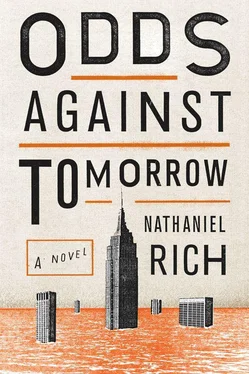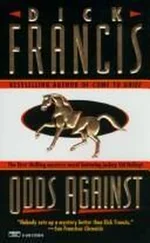“Did you just hiccup?”
“I hiccup when I’m surprised. Or scared.”
A noise like God cracking His knuckles. Silence — and then cheers from the people on the sidewalk.
“Jumping baby Jesus.”
“A bomb,” said Mitchell.
“No,” said Jane. “It’s much bigger than that.”
They approached the window, pressing their foreheads against the pane. Mitchell was careful not to hit his nose on the glass. There was another boom. They both lurched back.
“Thunder.”
“No way.”
“Unreal. Thunder. Unreal.”
A crack of lightning tore across the sky. More cheering.
“Wait a minute,” said Jane. “Is this going to be bad for business?”
“What are you talking about?”
“I was just hoping we could milk this drought for a few more weeks.”
Mitchell stared at her, uncomprehending. He was reminded that they saw the world in very different ways.
“Is this actually happening?” Charnoble had rushed into the room. His fists were clenched, like a child having a tantrum. “We have at least a dozen special drought consultations scheduled this week. No, this is no good—”
Beneath the cloud the sky was streaky and fish gray. On Columbus Avenue the crowds were gazing upward, their hands over their foreheads to block the sunlight. There was another crack in the sky, a gunshot to start a footrace, and they started running toward the park — a few people at first, then in bunches — whooping and laughing and pulling on their hair in disbelief.
Tewilliger appeared beside Charnoble. Seeing the crowds in the park, she shook her head with disapproval.
Jane grabbed Mitchell’s hand. Mitchell looked at their hands touching.
“C’mon,” said Jane.
“Where?”
She tugged on his hand.
“Might want to bring an umbrella,” said Charnoble, but they were already past him, racing down the hall.
* * *
A gray curtain of rain drew across the Great Lawn. Mitchell could hear it before it was upon them, a vociferous lashing of dried leaves and baked soil. Angry fist-size droplets detonated on the ground in front of them, and the sagging, wounded belly of the cloud passed over their heads. It was like walking under a waterfall or into a car wash. The rain pelted like hurled stones. The force was staggering. The people around him, raising their hands over their heads, laughed at its comical, bullying strength. They were like children being tossed around by a half-playful and half-malicious older brother.
The two futurists ran to the Great Lawn. A crowd had assembled in an impromptu dance circle. It was one of those blue-moon New York exuberant moments when strangers made eye contact, slapped hands, even embraced flesh to flesh. A utilities worker held his construction helmet in his outstretched hand; when it filled with water, he dumped it over his head, roaring with glee as the water cascaded down his shirt. Then he held the helmet out again. A woman in a beige business suit was carrying her heels in one hand, her bare feet clomping in the mud, her white blouse quickly becoming transparent. Children extended their arms like prophets, their heads back and mouths open. They caught the rainwater until their cheeks were full and then spouted it out like cherubic fountain statues. Jane grabbed Mitchell and pulled him into the circle. Without thinking he spun her around and dipped her, the rain splashing into her bright open face, and she burst into happy laughter. She had a distinctive laugh — a laughter arpeggio, accelerating from low quickly to high before descending again as she ran out of breath. She clenched her eyes shut and tilted back her head. The rain bounced off her exposed neck and gathered her hair into wild tendrils.
Yet Mitchell couldn’t help but notice how, as the water pelted the dirt, it did not seep into the ground. It collected in pools, as it would on a tarp. He was suddenly desperate to do research. He knew that most droughts ended not in a single rainstorm, but over weeks and even months — just as droughts didn’t begin overnight, but over months as rains came with less frequency. Normally a drought ended only once a certain minimum amount of rainfall had been recorded over the course of a season. But what happened when a major rainstorm followed a major drought?
He had stopped dancing. His pant legs were glutinous with leaf pulp.
“What is it?” Jane yelled over the water’s loud patter.
“We should probably go.”
“C’mon, Mitchell! Live. Live just a little bit.”
Jane started dancing with someone else, a cleanly shaved young man whose tie was winsomely dripping with mud. The crowds of people kept pushing past, running like mad to the Great Lawn.
Mitchell turned and walked against the crowd, back to the office. He felt very damp, and very alone.
3.
What to make of the mayhem on the streets, the adults frolicking like children under a park sprinkler? Was this what everybody had been waiting for? A sign of divine intervention? On television it seemed so: the weathermen were in ecstasies. After so many empty predictions of advancing storms, their jobs — if not their entire scientific discipline — had been on the line. Now they appeared live on every station, enjoying the bliss of exoneration. They gesticulated manically in front of their painted maps, fist-bumping their amused anchormen. Their speech was infected with grand metaphors and meteorologically themed clichés.
“There have come soft rains!”
“Gray skies aren’t gonna clear up. Put on a happy face!”
“Good day, no sunshine. Put on a happy face!”
The tristate area Doppler radar maps were obscured by a heavy neon green swirl. It was a large, messy storm system. There were low winds and heavy rainfall, a combination that indicated the storm would linger in the metropolitan area. It was moving in a northeasterly course; from what Mitchell could determine, Camp Ticonderoga stood directly in its path. And it seemed as if there were more storms to come. In the Atlantic Ocean, just north of San Juan, Tropical Storm Tammy was rapidly coalescing, and now seemed poised to pursue its weaker predecessor up the coast. Over on Channel 4, Big Henry D.’s eyes were spinning, mini-cyclones. In his high-pitched ecstasy he swayed back and forth, his legs pressed tightly together, like Tweedledum. He appeared not to have urinated since the storm first glided onto his Doppler.
Mitchell called Augusta General.
“Patient Bruner, huh? You the guy who phoned this morning?”
“That’s me.”
“I’m sorry. There’s been no change.”
“A big storm is coming your way,” said Mitchell. “Thought you might want to know.”
“Weatherman’s been predicting that for months,” said the receptionist. “He’s lying.”
Mitchell paused, wanting to ask her something else, to find out more information about the body of the foolish girl in the hospital bed. How closely were they monitoring her? Had they contacted her mother? Had they considered sending her to a hospital in, say, New York City, so that she could be examined by world-class specialists using state-of-the-art machines with names that the humble country doctors of Maine would not even be able to pronounce? But the receptionist had hung up.
A marine climatologist from the National Weather Service appeared on the office flatscreen. This man, pale faced and slightly cross-eyed, clearly lacked his colleagues’ exuberance. If anything, he appeared uneasy — an attitude that the anchorwoman seemed to find insulting. He spoke in a quiet, restrained voice and was distracted. He kept looking off camera to a live satellite feed of the tropical storm developing in the Atlantic Ocean just west of Bermuda.
“Dr. Walsh,” said the anchorwoman, “why aren’t you more pleased about this storm? Isn’t this what we’ve been begging for all summer? What we’ve been praying for?”
Читать дальше












